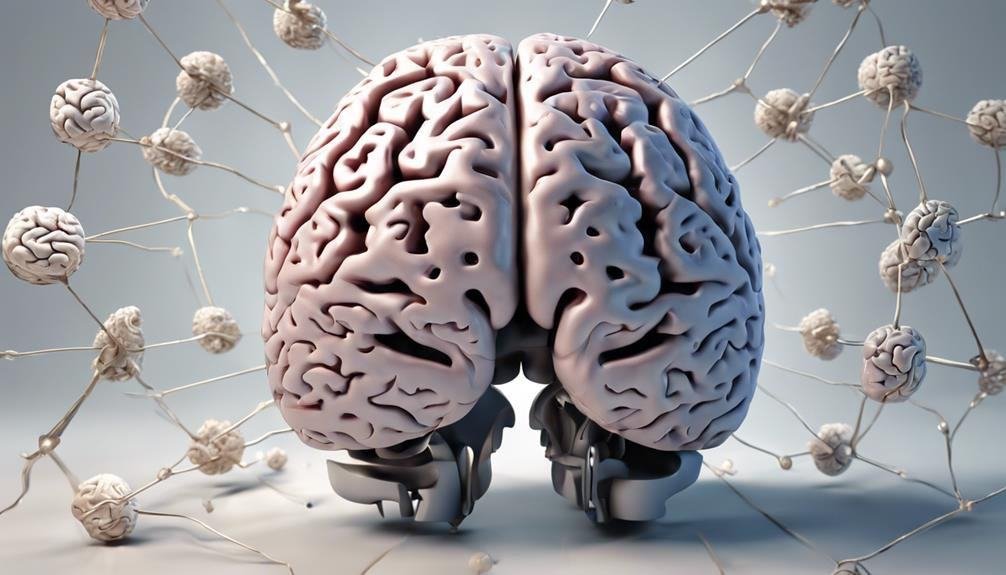The Psychology of Your Personality: Why You Act the Way You Do
Discover the intricate web of factors shaping your unique personality. Genetic predispositions, childhood experiences, and societal norms all play a role in defining who you are. Understanding your behavioral patterns, emotional responses, and defense mechanisms can shed light on why you act the way you do. The Big Five Personality Factors offer insight into your traits, while developmental stages highlight the evolution of your personality over time. By exploring these influences, you can gain a deeper understanding of yourself and unravel the complexities of human behavior. Reveal the layers of your personality to gain a greater self-awareness.
Key Takeaways
- Genetic predispositions interact with environment to shape personality.
- Environmental factors influence behavior and traits.
- Childhood experiences impact personality development.
- Societal and cultural norms greatly influence individual behavior.
- Understanding Big Five personality factors aids in understanding individual differences.
Understanding Personality Traits
If you've ever wondered why people behave the way they do, understanding personality traits can offer valuable insights into the complexities of human behavior. Behavioral patterns and emotional responses are key aspects that define how individuals interact with the world around them.
Behavioral patterns encompass the consistent ways in which individuals tend to act in various situations. These patterns are influenced by a combination of genetic predispositions, environmental factors, and personal experiences. By recognizing these patterns, you can gain a deeper understanding of why people react in specific ways or exhibit certain behaviors.
Emotional responses play an important role in shaping personality traits. How individuals express and regulate their emotions can have a significant impact on their relationships, decision-making processes, and overall well-being. By examining how different personality traits are linked to emotional responses, you can begin to unravel the complex web of human behavior.
The Role of Genetics
Genetics plays a fundamental role in shaping various aspects of personality, influencing traits such as temperament, emotional reactivity, and behavioral tendencies. The age-old debate of nature versus nurture comes into play here, as genetic predispositions interact with environmental influences to mold who you are. Your genetic makeup provides a blueprint for certain predispositions, like being more prone to anxiety or having a higher likelihood of being outgoing. These predispositions don't determine your entire personality but rather set the stage for how you might respond to different situations.
Understanding the role of genetics in shaping your personality can provide valuable insights into why you behave the way you do. It's essential to recognize that genetic factors interact with your environment, upbringing, and life experiences. This intricate interplay between nature and nurture highlights the complexity of human personality. While genetics lay the foundation, environmental factors also play a significant role in shaping your personality over time. By acknowledging these influences, you can better understand and navigate your unique personality traits.
Environmental Influences on Behavior
Environmental factors greatly influence your behavior and contribute to the development of your personality traits. Peer pressure, a powerful force, can shape your actions and decisions. You may find yourself conforming to the expectations of your peers, adopting behaviors you wouldn't exhibit otherwise. This influence can be both positive and negative; it may motivate you to excel in certain areas or lead you down paths you wouldn't choose independently.
Workplace dynamics also play a significant role in your behavior. The environment at work, including the relationships with colleagues, superiors, and the overall culture, can impact how you interact and perform. For example, a competitive work environment might encourage you to achieve success, while a supportive one could enhance your creativity and collaboration skills. Recognizing these influences can help you navigate social situations with more awareness and autonomy, allowing you to stay true to yourself while adapting to different environments.
The Big Five Personality Factors
Have you ever wondered what factors shape your personality and influence the way you interact with the world around you? Trait assessment plays a significant role in understanding individual differences in personality.
Personality research has identified five key factors, known as the Big Five Personality Factors, that encompass the core dimensions of personality: openness, conscientiousness, extraversion, agreeableness, and neuroticism.
Each of these factors represents a spectrum, with individuals falling somewhere along each continuum. Openness reflects one's willingness to embrace new experiences and ideas, while conscientiousness pertains to organization and reliability. Extraversion relates to sociability and assertiveness, while agreeableness involves traits like empathy and cooperation. Neuroticism, on the other hand, encompasses emotional stability versus reactivity.
Impact of Childhood Experiences
Exploring the formative role of early life experiences on personality development reveals profound insights into the complexity of human behavior and individual traits. Parental attachment plays an essential part in shaping your personality. A secure attachment to caregivers in childhood often results in individuals who are more confident, emotionally stable, and better at forming healthy relationships.
On the other hand, early trauma, such as neglect or abuse, can have lasting effects on your personality. It may lead to difficulties in trusting others, low self-esteem, or struggles with emotional regulation. These experiences can influence how you perceive yourself and interact with the world around you. Understanding the impact of childhood experiences allows for a deeper comprehension of why you may exhibit certain traits or behaviors.
Social and Cultural Factors
Considering the intricate interplay between societal norms and individual identity, one's personality is greatly influenced by social and cultural factors. Cultural norms, shaped by traditions, values, and beliefs within a society, play a significant role in determining behavioral patterns. These norms define what's considered acceptable or taboo, impacting how individuals express themselves and interact with others. For instance, cultures that prioritize collectivism may foster traits like cooperation and harmony, while individualistic cultures could promote independence and competitiveness.
Social interactions also wield a powerful influence on personality development. The way you engage with peers, family, and communities shapes your social skills, communication style, and emotional intelligence. Positive interactions can boost self-esteem and empathy, contributing to a more nurturing personality. Conversely, negative experiences may lead to social anxieties or trust issues, affecting how you perceive and relate to others.
Psychological Defense Mechanisms
Understanding the complexities of human behavior, psychological defense mechanisms serve as essential tools for protecting the mind from distressing thoughts and emotions. These coping mechanisms play a vital role in emotional regulation, helping individuals manage challenging situations and maintain psychological well-being. When faced with overwhelming feelings or threatening situations, unconscious behaviors kick in to shield the ego from harm.
Emotional regulation is at the core of these defense mechanisms, allowing you to navigate through life's ups and downs without being consumed by negative emotions. By understanding the intricacies of these processes, you can gain insight into why you react a certain way in different circumstances.
Ego defense mechanisms operate beneath the surface, influencing your thoughts and behaviors without conscious awareness. These mechanisms help you maintain a sense of stability and protect your self-esteem when faced with internal or external stressors. By recognizing these patterns, you can develop a deeper understanding of your own psyche and enhance your ability to cope with life's challenges.
Personality Disorders and Disorders
As you explore the world of human behavior, delving into the intricacies of psychological defense mechanisms reveals a gateway to understanding how individuals cope with challenging situations; shifting focus to Personality Disorders and Disorders uncovers the impact of these coping mechanisms on long-term psychological well-being.
- Understanding Personality Disorders: Personality disorders encompass a range of conditions that affect how individuals perceive and interact with the world around them.
- Impact on Relationships: These disorders can greatly strain relationships with friends, family, and colleagues.
- Challenges in Daily Functioning: Individuals with personality disorders may face difficulties in managing emotions and behaviors in their daily lives.
- Treatment Options: Seeking professional help through therapy, medication, or a combination of both can be beneficial for managing symptoms.
- Coping Strategies: Developing healthy coping strategies such as mindfulness, self-care, and seeking social support can aid in navigating the challenges posed by personality disorders.
Personality Development Over Time
As you journey through life, your personality undergoes significant changes influenced by your experiences and relationships. Childhood lays the foundation for your personality, shaping your core traits and behaviors.
Adolescence is a period of identity exploration and formation, leading to the development of a more complex sense of self.
In adulthood, your personality tends to stabilize, but it continues to evolve subtly in response to life events and personal growth.
Childhood Influences on Personality
During childhood, experiences and interactions play a significant role in shaping and molding your personality over time. Early experiences and parental influence can have a lasting impact on the development of your character.
Here are a few ways in which childhood influences can shape your personality:
- Attachment Styles: The attachment you formed with your caregivers can influence how you relate to others.
- Social Skills Development: Interactions with peers and adults can shape your social skills and communication style.
- Emotional Regulation: Learning to manage emotions early on can impact how you handle stress and challenges later in life.
- Sense of Self: Childhood experiences contribute to the formation of your self-concept and self-esteem.
- Behavioral Patterns: Patterns established in childhood, such as coping mechanisms, can persist into adulthood.
Adolescent Identity Formation
Investigating adolescent identity formation reveals an important stage in understanding how personality evolves over time. This period is marked by intense self-exploration and identity crisis as individuals seek to answer fundamental questions about themselves.
Peer influence plays a significant role during this phase, impacting self-expression and shaping beliefs and values. Adolescents often experiment with different personas, trying to find where they fit in the world. This search for identity can lead to internal conflicts but is essential for personal growth and the development of a stable personality.
Embracing these challenges and experiences allows individuals to navigate through this transformative stage and emerge with a clearer sense of self.
Adulthood Personality Stability
Exploring the stability of personality traits throughout adulthood provides valuable insights into how individuals evolve and adapt over time. Long term stability in personality traits is a key aspect of adult development, influencing how you interact with the world around you.
While some traits remain consistent over time, others may undergo developmental changes as you experience new life events and challenges. Understanding the balance between stability and change in your personality can help you navigate relationships and career choices more effectively.
It's important to remember that personal growth is a continuous process, and embracing the evolving nature of your personality can lead to greater self-awareness and fulfillment.
- Long term stability in personality traits
- Influence of life events on personality development
- Balancing consistency and adaptability in adulthood
- Embracing personal growth as a continuous journey
- Self-awareness and fulfillment through understanding personality evolution
Conclusion
As you reflect on the psychology of your personality, remember that you're a complex blend of genetics, environment, and experiences.
Like a mosaic made up of different pieces, your personality is unique and ever-changing.
Just as a garden needs various elements to thrive, your personality requires nurturing and self-awareness to grow and flourish.
Embrace your individuality, understand your motivations, and continue to evolve as you navigate the journey of self-discovery.








